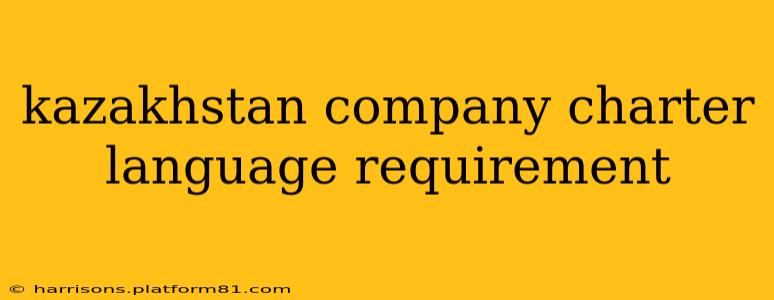Establishing a company in Kazakhstan requires careful attention to detail, particularly concerning legal documentation. One crucial aspect is the language used in your company charter. This guide comprehensively outlines the language requirements for company charters in Kazakhstan, addressing common questions and providing clarity on the process.
What Language Must a Company Charter in Kazakhstan Be Written In?
The official language of Kazakhstan is Kazakh, and all legal documents, including company charters, must be drafted in Kazakh. However, a significant caveat exists: a translated version in Russian is also mandatory. Therefore, you'll need two versions of your charter: one in Kazakh and another in Russian. Both versions hold equal legal weight.
Are Other Languages Permitted in a Company Charter?
While Kazakh and Russian are legally required, there's no explicit prohibition against including additional languages. However, it's crucial to understand that only the Kazakh and Russian versions will carry legal significance. Any other language included would be for informational purposes only and will not be considered official documentation by the relevant Kazakhstani authorities. Adding other languages might even lead to confusion during registration and subsequent legal proceedings. Therefore, sticking to the legally required Kazakh and Russian versions is strongly recommended.
What Happens if the Charter is Only in Russian?
Submitting a company charter solely in Russian will result in rejection. The Kazakh version is absolutely mandatory for legal compliance. The authorities will not register the company without both versions.
Does the Translation Need to Be Certified?
While not explicitly mandated by law in all cases, it is strongly advised to use a certified translation. This adds an extra layer of legal validity and reduces the risk of rejection due to discrepancies or inaccuracies in the translation. A certified translator can ensure that the meaning and legal intent are accurately conveyed in both languages. Seeking a certified translator is a best practice to avoid delays and potential complications.
Who is Responsible for the Translation?
The responsibility for providing accurate and legally compliant translations of the company charter rests with the company founders or their designated legal representative. This is a critical aspect of the incorporation process, and any inaccuracies can lead to significant delays or outright rejection of the application. It's essential to choose a translator with proven experience in legal documentation and familiarity with Kazakhstani legal requirements.
What are the Penalties for Non-Compliance?
Failure to comply with the language requirements for a company charter can lead to the rejection of your application for company registration. This will cause significant delays and necessitate correcting the documentation before resubmission. In some instances, non-compliance might also incur administrative penalties or fines, adding to the already complex registration process.
Can I use an online translation service for my company charter?
While online translation tools might seem convenient, it's strongly discouraged to use them for translating a legally binding document like a company charter. These services often lack the nuance and legal expertise necessary to accurately render the legal terminology required. The implications of inaccuracies in a legal document can be severe, making professional certified translation an absolute necessity.
By adhering to the language requirements outlined above, you will significantly increase the chances of a smooth and successful company registration process in Kazakhstan. Remember, prioritizing accuracy and legal compliance is key to establishing a robust and legally sound business foundation.
